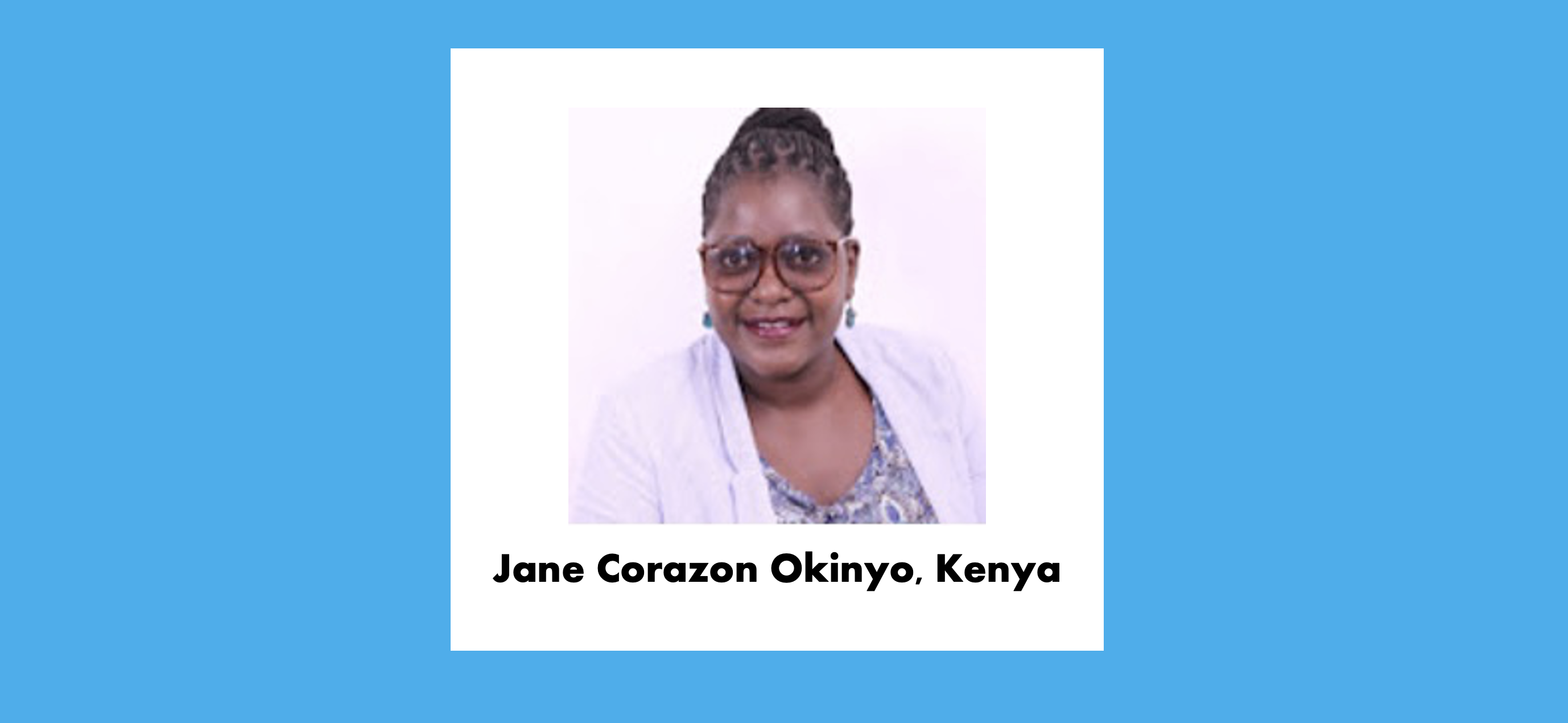Jane Corazon Okinyo
Jane is a clinical psychologist working in Kenya
Jane Corazon Okinyo is a Clinical psychologist with 10 years working with special populations. Her desire to work with the vulnerable in the community led her to work with clients in Human Rights spaces. She previously worked at Kituo Cha Sheria -Forced Migration Program & The Centre for Victims of Torture where her clients were predominantly refugees dealing with trauma from war & torture. Currently, she is providing psychological counselling to victims of human trafficking at Awareness against Human Trafficking (Haart Kenya).
As a clinical psychologist, I am privileged to work with Urban Refugees and asylum seekers in Nairobi, Kenya. We offer psychosocial support to clients from different countries presenting psychological effects from war, torture and death they may have witnessed. Majority of the clients are from Burundi, Somalia, Democratic Republic of Congo, Ethiopia, Eritrea and South Sudan. According to the statistics from the Kenyan Government and UNHCR-The UN Refugee Agency, as of 31st December 2021, the total number of refugees and Asylum seekers in Kenya was 540,068. The Urban refugees account for sixteen percent (16%) of this population (https://www.unhcr.org/ke/wp-content/uploads/sites/2/2022/01/Kenya-Infographics-31-December-2021.pdf)
Our work is not just limited to the provision of psychological support, but we also encounter human rights violations that are connected to our clients. The violation of their fundamental rights further contributes to the psychological distress of the clients, consequently compounding the already traumatic symptoms that the clients present in sessions.
They seek psychosocial support either immediately on arrival in the country or later after a long stay in the country. Their concerns therefore may be varied as is their resilience levels. In most cases, they seek assistance after exhibiting post-traumatic stress symptoms that debilitates their ability to effectively function and cope in their families and communities. These symptoms are exacerbated by the daily experiences as they cope in the new environments.
When Refugees and asylum seekers arrive into the country officially, they are received at different reception areas by governmental officials for status determination. These officials not being trauma informed, may unknowingly further traumatize them in their service delivery. Some of the officials are not patient in providing information that would be crucial for better adjustment. When the clients visit a psychologist, it is imperative that they get a different experience. Apart from the psychological support, it is also an opportunity to provide information on where they can get assistance through provision of referrals to other organizations. Through collaborations with other organizations and advocacy, clients are able to receive vital services.
The right of movement of the refugees and asylum seekers is always in constant jeopardy. The Refugees Affairs Secretariat in Kenya, issues documentation that aid the movement of the said affected people and the verification of their status. However, these documents are not recognized by some government administrative officers and enforcement officers. The refugees and asylum seekers are always at a risk of being harassed when they walk around. There are cases of arbitrary arrests and bribery to the enforcement officers being reported. These events act as triggers of posttraumatic symptoms; with clients reporting heightened fear and paranoia, consequently hindering treatment and healing. To facilitate the healing process, the sessions remind and assure client of their worth, and information on their rights, privileges and responsibilities is shared. At Kituo Cha Sheria (Forced Migration Program), an organization that offers legal and psychosocial support to refugees and asylum seekers, as Psychologists are at the front line to train government officials, police and court officers on effects of trauma on clients and showcase the different movement documents issued to our clients to reduce cases of harassment. The negative experiences from service providers who are not trauma informed also trigger hopelessness and helplessness, yet these vital emotional states are crucial for resilience in the client’s protracted situations. They may be having livelihood concerns, health matters but due to fear they are unable to approach different organizations for assistance. When they seek psychosocial support, they are accorded opportunities to share their experiences in a safe environment. This increases their confidence levels as they learn to express themselves clearly and firmly. These skills acquired will be vital as they gain courage to pursue their right of access to information and services. All officials that have one on one interaction with the refugees and asylum seekers should be trained on trauma informed service delivery. This will ensure services they offer convey principles of safety, offer choices, partnerships and empowerment of the clients (Fallot and Harris,2001). The threats of refoulement of refugees and asylum seekers by the Kenyans government is always a relentless threat. In 2016, Government of Kenya called for the disbanding of Department of
Refugees Affairs and closing of Daadab Camp that holds mostly people of Somali descent in contravention of the principle of non-refoulement (https://www.unhcr.org/ke/figures-at-a-glance). In March 2021, the government announced that it would be closing down Kakuma and Daadab camps. Voluntary repatriation to countries of origin was issued as an option for the refugees and asylum seekers. These pronouncements were a source of great anxiety to the clients and increased feelings of uncertainty. Psychologists have been at the front line of advocacy on the repercussions of refoulement in this case without proper planning and being forced to go back to unsafe settings.
This article only highlights the some of the human rights concerns and cannot fully illustrate all the advocacy efforts that we as psychologists are called to be involved in. It is clear that it is crucial for us to be aware of our role in educating our clients on their rights, and emphasis on the provision of trauma informed service delivery from government officials and other service providers.
References
Harris, M., & Fallot, R. D. (2001). Envisioning a trauma-informed service system: A vital paradigm shift. In M. Harris & R. D. Fallot (Eds.), Using trauma theory to design service systems (pp. 3–22). Jossey-Bass/Wiley.
Statistics of refugees and Asylum seekers – https://www.unhcr.org/ke/wp-content/uploads/sites/2/2022/01/Kenya-Infographics-31-December-2021.pdf

